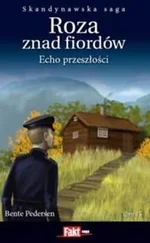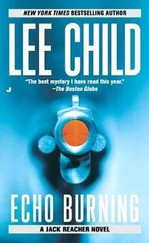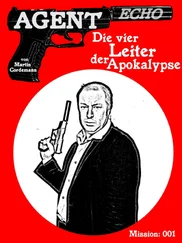She could feel the muscles jump in her legs as she approached the coats. The weight of her body felt light in her ruined boots. They would be musty and rotten, the coats, and there would be thirteen of them. But there were only nine. And when she reached out and touched one, the nap of the fabric, where it was not mud-splashed, was firm and heavy and still soft. She turned the collar of the garment on its hook and could just make out the name, the letters forming it, Waltrow S , machine-stitched on to the pale name tag in red thread. Suzanne recoiled from the greatcoat as light and noise drifted into the building, and she cried out aloud and put her hands to her face.
‘ Madame? ’
There was a figure at the door in a rain cape and a hat.
‘ Madame? ’
The farmer Pierre Duval had a shotgun broken over his arm. He was tall in the bath of light at the door and wore a hat with a dripping brim and a heavy moustache and the rain cape was black and slick with moisture. He might keep his earlier promise and not shoot her, but he had brought the gun as a precaution. He frowned at her. In better English than he had displayed over the phone, he said, ‘Have you discovered what you came for?’
She gestured vaguely at the crates, at the pyramid of beets. ‘You use the place for storage?’
He looked around. He had not crossed the threshold. She sensed that he was reluctant to do so. She remembered what Martin had said about Frank Hadley’s refusal ever to call Harry Spalding’s boat by its name. He shifted on his heels and the twin barrels of his shotgun rose and descended again over the crook of his arm. ‘I never come here,’ he said. ‘Nothing of this is work of mine.’
It was very quiet. Suzanne could hear rain splash on the step at the entrance as it dripped from the hem of Duval’s rain cape. She did not understand. And then she thought that perhaps she did.
‘Nothing rots in here?’
He just looked at her. The double shotgun barrel was thick and heavy-seeming, and it gleamed in the matt light from the sky as it rested over his forearm.
‘Nothing perishes?’
‘Not in my lifetime, madame . Nor in my father’s. And nor in his. It is nature’s joke.’ The expression in his eyes told her plainly that Duval knew it was a joke played not by, but against nature.
She turned and looked back behind her at the still pyramid of beets rising from the floor at the building’s centre. She tried to imagine song and camaraderie and the warmth of a campfire with a coffee pot or a bacon skillet rigged over the flames. But the image defeated her. She looked again to the ghostly company of coats in their line against the wall. Stillness and darkness were the only discoveries here. As it was a place where nothing perished, so it was a place where nothing lived. Derry Conway had managed to die here in the autumn of 1917. But Suzanne, having seen the place, having felt its raw malevolence, was pretty sure that Derry Conway had been assisted in achieving his death. She shivered again. What manner of man could ever have found comfort here?
‘There is coffee inside,’ said Pierre Duval, who had seen her shiver, gesturing in the direction of the farm. ‘You were unwise to walk here. Come.’
He had parked his battered Land Rover behind the line of poplars. She thought it odd that she had not heard the approach of its labouring engine, because the engine did labour, when he started it. It chugged and then when he depressed the accelerator pedal, it roared and the vehicle vibrated on its high springs. But too much else was odd about the barn for the failure of sound to carry there to worry Suzanne unduly. She was grateful for the lift. With Duval’s shotgun resting across the back seats, she was grateful also for the company.
He progressed beyond the farmyard, to another structure that the farmyard buildings themselves had obscured during her brief earlier exploration. And he parked outside it. This was a modern dwelling made of wood and designed to blend in with the earth and trees surrounding it. It looked more Scandinavian than typically French. She could see how she had missed it in her aerial search, looking for old stone and sagging clay tiles. Its steep roof was earth-coloured and made of some modern material. Its windows were tinted on the outside so that the building did not reflect light.
The impression that farming was a profitable business after all for Pierre Duval was strengthened when he unlocked the door and she was invited inside his home. He did not like clutter. But his furniture looked expensive. The kitchen was a hard, shining array of steel and granite. A large plasma television screen was mounted on one wall of his sitting room. There were logs in the open iron grate but the fire was unlit. He had a laptop on a small desk and a Bang & Olufsen stereo system in one corner with three immaculate rows of CDs stored on shelves above it. No one else lived here, she was certain. Pierre Duval did not share his life. She smiled inwardly at the thought that he had once lived amid the fading enamel and linoleum squalor apparently abandoned a few hundred metres behind them.
He took her coat and removed his and went to hang them where he said they would dry, and then he gestured for her to sit while he made the coffee. She had wiped her feet vigorously on the doormat outside. Now she saw that her muddy boots had trailed a few crumbs of wet earth across Duval’s wooden floor. He would notice; the place was otherwise immaculate. But she did not think he would mind. She had picked a careful path between his scattered and expensive-looking rugs. And she sensed he had invited her in for a reason beyond her wish for something hot and sustaining to drink. She was here because he wanted to tell her something. He would tolerate a bit of mud to hear it told.
‘In 1917 my grandfather was a boy,’ he said, seated in the chair opposite hers when they both had their coffee. ‘He was fourteen and he was very innocent. He liked the Americans. He liked the doughboys. They were generous with their chocolate and their chewing gum. They were cheerful. Many of them, whole battalions of their infantry, were coloured soldiers. Were you aware of that fact?’
‘None of the Jericho Crew was black,’ Suzanne said.
Duval did not answer her. He looked down at the contents of his cup. ‘My grandfather was Pierre Duval also. And he was still a child. And the war was a great adventure. When the soldiers marched, they sang. Most of them sang. The Scots marched to the pipes, to their tunes of glory in their fighting kilts, with their battle standards raised. At night, in their camps, the coloured doughboys sang their slavish songs of devotion to God.’
‘Spirituals,’ Suzanne said.
Duval smiled, as though he himself were remembering. ‘Their spirituals, yes, of course. They sang their spirituals in this land so far from home, in their canvas settlements, and their strong and ardent voices carried through the night. How marvellous and strange that must have sounded, here.’
He stopped. Suzanne felt no compulsion to interrupt the silence. He sipped coffee. ‘It was all a great adventure to the boy who would become my grandfather. It must have seemed to him as an epic film in the cinema would. And then the Jericho Crew came here,’ he said. ‘And they did not sing, madame . They did not sing at all.’
Pierre Duval, who was fourteen and for whom the war was a great adventure, had seen none of the crew. They moved by night. And they moved with the stealth of ghosts. But he had seen the night glow sometimes of their fires. And knowing the friendliness of the Allied troops generally, and overcome with curiosity, he had approached the barn.
He had done so very quietly and carefully. He did not wish to be mistaken for an approaching enemy, nor to be mistaken for game and shot. His plan, such as it was, was simply to reveal himself in plain sight when the light of their encampment could illuminate him as a harmless, unarmed boy. Later, he was thankful for this cautious instinct because he was sure it saved his life. At the time, as he approached along the forgiving autumn earth between the poplars and the drainage ditch, he felt only a boy’s excitement.
Читать дальше












